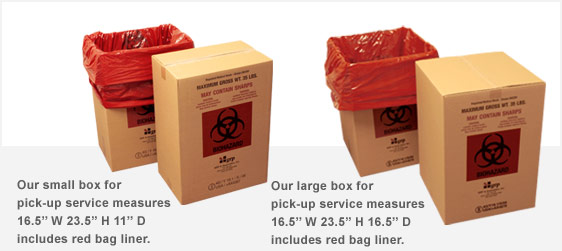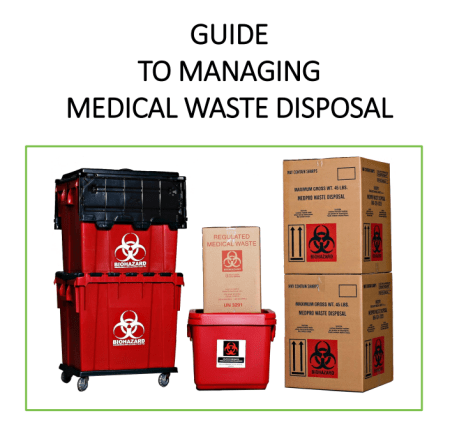Responsible Solutions: Recognizing Medical Waste Disposal Provider
In the realm of health care, the correct disposal of medical waste is a critical facet that demands careful consideration. As health care centers generate numerous types of waste that need specialized handling, recognizing the subtleties of clinical waste disposal solutions is paramount.
Relevance of Correct Clinical Garbage Disposal
Proper clinical waste disposal is critical in keeping a hygienic and risk-free setting within medical care facilities. In health care settings, numerous types of waste are created daily, including transmittable materials, sharps, ended medicines, and chemical compounds.

Types of Medical Waste
Within medical care centers, a diverse range of waste products identified as clinical waste is produced, each needing certain handling and disposal techniques. Pathological waste, which consists of cells, organs, and body parts, demands correct disposal to respect the self-respect of the deceased and stop any type of biohazards. Comprehending the various kinds of clinical waste is vital for health care centers to apply reliable waste monitoring approaches and shield public wellness and the setting.
Regulations and Conformity
Healthcare centers must abide by stringent regulations regarding the handling and disposal of medical waste to guarantee conformity with legal needs and guard public health. These guidelines are established to protect against the spread of infections, secure the atmosphere, and maintain the security of medical care employees and the public. Different regulative bodies, such as the Epa (EPA), the Occupational Safety And Security and Wellness Management (OSHA), and the Department of Transportation (DOT), have particular guidelines that health care centers should adhere to.
To adhere to these policies, health care facilities need to correctly set apart, shop, transport, and dispose of various sorts of clinical waste. This consists of sharps waste, infectious waste, contaminated materials, and pharmaceutical waste, each requiring particular managing procedures. Facilities should also preserve exact records of waste generation and disposal to demonstrate conformity during assessments.
Non-compliance with medical waste policies can cause serious fines, penalties, and damages to the center's reputation. Consequently, it is necessary for health care facilities to remain notified concerning the most up to date guidelines and execute durable conformity steps to secure public wellness and the setting.
Advantages of Professional Disposal Services
Involving professional medical garbage disposal solutions offers health care centers a effective and dependable service for handling hazardous materials. By outsourcing this important job to professionals, medical care facilities can ensure conformity with guidelines while concentrating on offering quality like clients. Among the vital advantages of professional disposal solutions is the competence they offer the table. These solutions use experienced experts who are well-versed in dealing with different kinds of medical waste, making sure proper segregation, product packaging, disposal, and transport.
Additionally, expert disposal solutions make use of cutting edge devices and follow industry best practices to decrease environmental impact and reduce the threat of contamination. This not only advertises a much safer workplace for medical care staff but additionally adds to overall public health and wellness and security. Furthermore, contracting out medical garbage disposal can result in set you back financial savings in the long run by removing the need for internal administration and disposal systems.
Lasting Practices in Healthcare

One secret sustainable practice in healthcare is Going Here waste decrease. By executing approaches to decrease unnecessary product packaging, single-use products, and total waste generation, healthcare centers can substantially lower the amount of waste sent to landfills or incineration. Additionally, recycling programs for materials like glass, paper, and plastic can better lower the ecological impact of healthcare procedures.

Conclusion
To conclude, correct clinical waste disposal is important in keeping a healthy and safe setting for both healthcare employees and the basic public. Recognizing the various sorts of medical waste, adhering to regulations and conformity criteria, and using professional disposal services are crucial action in liable waste administration. By embracing sustainable practices in health care facilities, we can reduce ecological impact and make certain the wellness of all individuals associated with the healthcare sector.
As healthcare centers generate numerous types of waste that need customized handling, comprehending the nuances of medical waste disposal solutions is paramount.Within healthcare facilities, a varied array of waste products identified as clinical waste is created, each requiring details handling and disposal techniques. Recognizing the various types of clinical waste is crucial for health care centers to implement reliable waste administration strategies and secure public health and the atmosphere.
By implementing techniques to minimize unneeded product packaging, single-use items, and general waste generation, medical care centers can significantly reduce the amount of waste sent out to land this page fills or incineration. Understanding the various kinds of clinical waste, complying with regulations and compliance requirements, and using specialist disposal services are essential steps in responsible waste management.